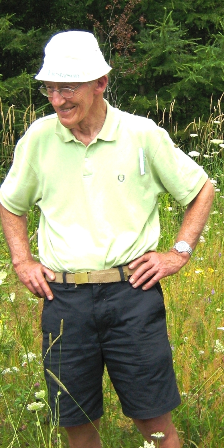Meet a Beekeeper
Harold Specht- A Close Eye for Over 60 Years One of the faithful and regular attendees of Martime Beekeeping events is Harold Specht, usually in the company of Frank Woolaver. These two genial and lanky old guys have been keeping bees separately and together for nearly sixty years. For the recent PEI- hosted Martime Bee Tour, Harold arrived with his one man tent, pitched it in the rain, spent two rainy rent-free nights in it, and got up smiling and limber to enjoy the day's activities. Harold believes that close control of input costs is part of successful beekeeping. Harold lives in Kentville and currently keeps 26 hives of bees in yards located at Digby, Middleton, Mahone Bay, Fauxburg and Lunenburg. He and Frank had kept as many as 400 hives in the Valley, but high hive concentration in the Valley led Harold to go further a-field. A brother living in Digby, his old family home, and a daughter living in Lunenburg led him to set up yards that, though involving miles of travel, have the bonus of a family visit at the end of each circuit. Harold rents his hives for pollination, as he has always done. He delivers them to Jack Hamilton in Aylsesford each May where they are palletized and shipped out for blueberries. Sometime in July they are returned to him, directly into his out yards. Bragg Lumber is a good pollination customer and treats him well. The bees suffer in the pollination period so Harold is more concerned about maintenance than a honey crop. Eric Nickerson does extract and buy Harold's surplus, but most of the honey goes to the bees. It all began in 1949. Harold and his friend Frank had spent two years at NSAC -1946 and 1947, then two years at MacDonald College in Montreal -1948 and 1949 where they had attained degrees. Their courses at NSAC had included "science courses" and half year "farm courses" –among them beekeeping, taught by Mr. Payne. Frank went to dairy farming. Harold got a job at the Kentville Research Station as a tree fruit entomologist. His job involved a lot of tramping around orchards and getting stung –by hornets. He thought the painful reactions might force him to quit. Then he picked up on a suggestion that keeping bees might help him develop immunity to stings so he bought a couple of hives from Frank. He did develop immunity – to bee stings, not hornet stings, but he kept his entomology job anyway, leaving the Valley in 1950/51 to do a Masters in Entomology in Wisconsin and in 1955/56/57 to do a PhD at Rutgers in New Jersey. The beekeeping continued as a sideline to career and family that grew to five children. The initial two hives grew to 20 when a colleague left on a sabbatical in 1952. Then a neighbouring friend and farmer died in 1954 and Frank and Harold got another 100 hives from his widow. At this time Endel Karmo and Vernon Vickery were promoting bees for orchard pollination. Harold and Frank would share the work and the pollination and honey income. When Harold returned from Rutgers, blueberry pollination started to become more significant, and they eventually expanded to 400 hives, rented principally to M.W. Graves Company that owned blueberry acreage in Colchester and Cumberland Counties. Once, Harold and Frank arrived at Parrsboro with their truckload for Dickson Brothers and the renter said "I see the bees, but where are the hives?" The hives were plastered so thick with bees the supers couldn't be seen. Harold had other memories: of a flat tire as the sun rose on Sunday morning, with a load of bees and no jack; of blueberry growers happy to pick up hives, but if you wanted them back, better get them yourself; of a threatened small claims action to get his rent, but never retrieving the gear from that rental. Harold was sometimes disgusted and discouraged with beekeeping, what with the bees, the growers the bears and once, some hippies. A bear had bothered a bee yard, so Harold secured a permit to shoot the bear and a friend dispatched the bear. Some neighbouring back-to-the-landers who were apparently on the bear's side, took a shotgun and blew the side out of one of Harold's hives in retaliation. It was all package beekeeping at this time and through the 1980's, with bees gassed off in the fall, and Harold still misses the simplicity of this approach. About 1980, Frank went out of the dairy business and into beekeeping full time, and it was at this time that Harold and Frank dissolved their beekeeping partnership. When packages became more expensive and eventually unavailable, Harold tried buying over-wintered nucs locally, then he relented and tried over-wintering himself, but less successfully than Frank, he says, because, he thinks he fed less sugar. (See paragraph one) Finally, he sold all his bees to Eric Nickerson and went spring skiing at Sugar Loaf one year with an untroubled heart. But then he got lonesome for bees again, and got some more and installed them in some equipment he'd saved at his mother's place in Digby. Harold's mother died in 1998 at age 98. Let's hope that Harold and his bees have an equally long run. |
